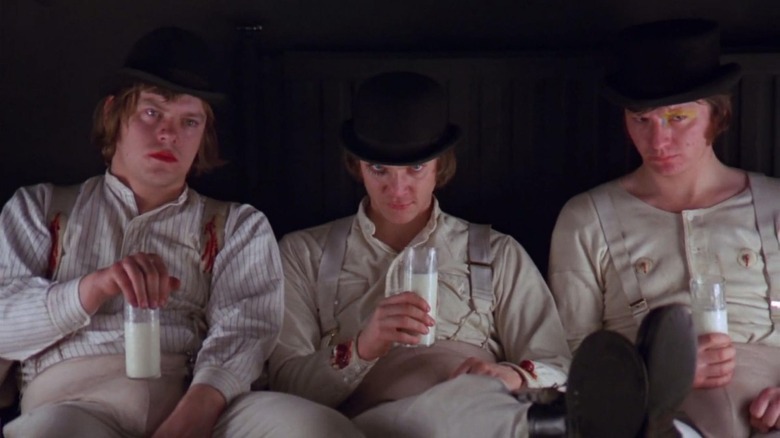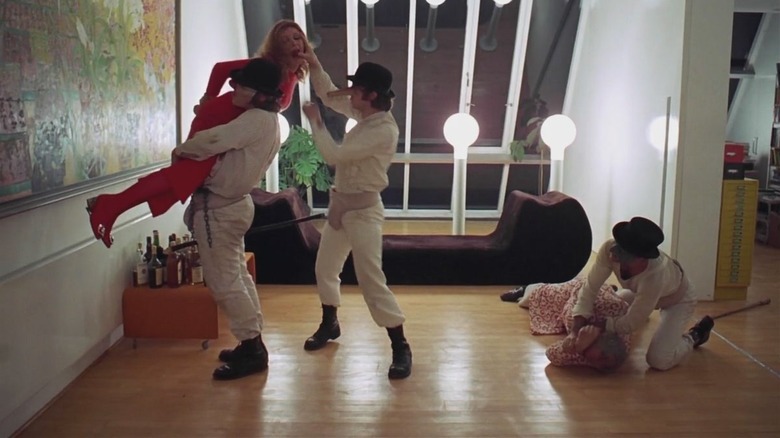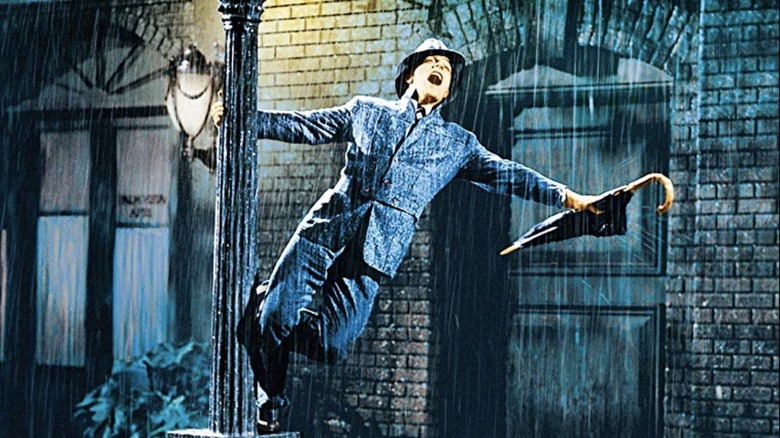The Clockwork Orange Scene You May Not Have Known Was Improvised
A grim, ultraviolent tale set in a dystopian future, "A Clockwork Orange" is one of Stanley Kubrick's most controversial films. Malcolm McDowell gives a spine-tingling performance as Alex DeLarge, a charismatic yet psychopathic delinquent with nefarious, loyal followers called "droogs" who spend their days torturing others for fun. The twisted film was stamped with an X rating and removed from distribution in Britain. "A Clockwork Orange" is based on Anthony Burgess' novel of the same name, which was similarly banned from classrooms and libraries.
One of the film's most notorious and difficult-to-watch scenes occurs during a home invasion where Alex and his droogs violate an elderly writer and his wife. Alex rings their doorbell and pretends that his friend is dying and he needs to ring the ambulance. Although the wife is hesitant to let them in, she acquiesces at her husband's request. Suddenly, the entire group spills inside, their evil infiltrating the peaceful home. One of the droogs picks the woman up and throws her over their shoulder, the other pins the husband down.
While the couple is frozen in fear, Alex — who wears a sinister phallic-shaped nose— frolics around the room and starts to sing "Singin' in the Rain" while he slaps and gags the woman's mouth shut, then kicks husband in the stomach to the rhythm of the joyous tune — maliciously replacing "rain" with "pain." After trashing the man's office, Alex disrobes and rapes the frightened woman. Kubrick uses a fisheye lens to distort the image of the husband looking on in tears, emphasizing the repulsiveness of the situation and putting the audience in his horrified shoes. It's an absolutely chilling moment — and it was completely improvised by McDowell. McDowell's spontaneous routine would impact the film in substantial ways.
A Creepy Juxtaposition of Sound
Since "Singin' in the Rain" was not in the original script, Kubrick had to pay $10,000 to use the song in the scene and the end credits. For 10 days, Kubrick had been grinding his actors to work on the excruciating scene. Kubrick wanted the gang to do something more than simply have them demolish the house, so he asked McDowell to start dancing. It is a testament to McDowell's instincts that he was able to come up with a song that makes the scene even more terrifying than it already is. That Moment In points out how the "innocence of the music paired with the sexualized violence and gleeful delight" is utterly chilling. McDowell describes "Singin' in the Rain" as the "most euphoric song in film history" and its inclusion in the scene "took things into a surreal place" (per The New York Post).
Gene Kelly's good-natured musical number from one of the most comforting American musicals of all time being used to soundtrack a woman's brutal rape is gut-wrenching. Music paradoxically contradicting what is shown on screen is known as "sound dissonance." Films Fatale describes sound dissonance as "the use of a song or composition that greatly contrasts the visual subject or activity." These moments "creep into your soul, but they also have a rhythmic pulse to them. Often, you'll find it nearly impossible to separate the song from the scene." Other filmmakers would use this technique, such as Quentin Tarantino's "Stuck in the Middle With You" scene in "Reservoir Dogs" and David Fincher's use of "Orinoco Flow" in "The Girl With the Dragon Tattoo."
The disharmony between "Singin' in the Rain" and the gang's cruel acts discomforts the audience and amplifies the couple's traumatic experience as their private space is violated by these evil men. The juxtaposition also expresses how Alex causes innocent people's pain for his own selfish enjoyment.
Gene Kelly's Reaction
Legend has it that Gene Kelly was angry with Stanley Kubrick and Malcolm McDowell for inserting his legendary musical number into such an aberrant scene. He reportedly rebuffed McDowell after a big Hollywood party shortly after the film was released. McDowell told The Hollywood Reporter that after being introduced, Kelly took one look at him and walked off. McDowell was understanding: "He cut me dead. Can you blame the poor man? I took his wonderful moment and completely f***ed with it." But it turns out he was wrong about why Kelly was mad. Decades later, the actor finally learned the truth about Kelly's annoyance:
"I am telling this story to the Academy, and afterward this lady came up and said, 'I'm Gene's widow. Gene wasn't upset with you, Malcolm. He was really upset with Stanley Kubrick because he hadn't been paid.' And I went, 'My God, there's quite a gang of us who haven't been paid!'"
Although it may not have worked out for Gene Kelly, Malcolm McDowell's improvisation on the "A Clockwork Orange" set was a stroke of genius that made cinema history.


